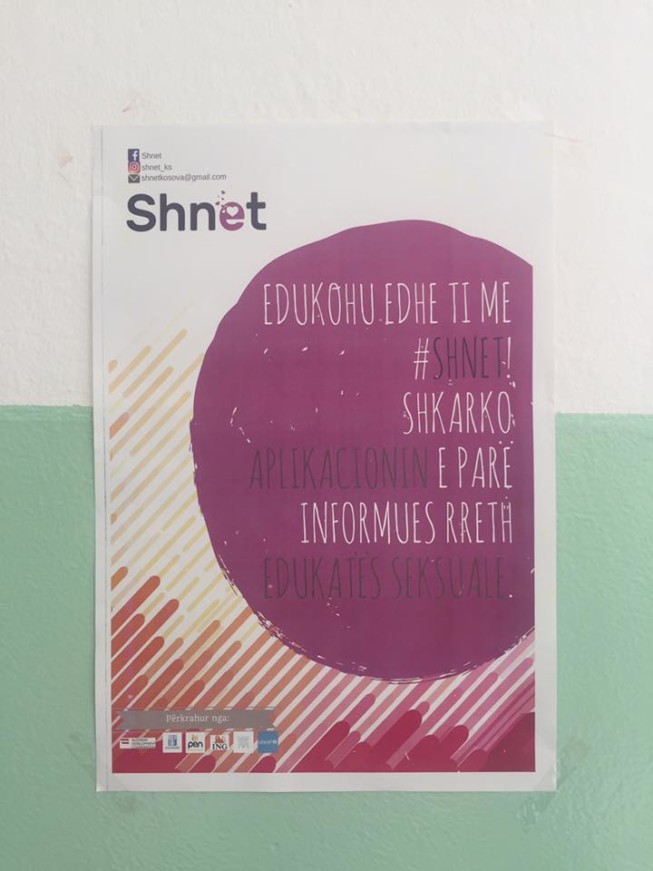It took four months of intensive work for four graduates of the Faculty of Psychology at the University of Prishtina (UP) to launch an online application for sexual education and reproductive health.
In November 2016, Dea Rexhepi, Tuena Govori, Eurisa Rukovci and Vlora Shabani won a grant to create the online platform “Shnet” (Health), in the “Upshift” competition organized by “Innovation Lab Kosova” in Prishtina, on the topic of ‘Gender Equality.’
The project was launched in February 2017.
“Innovation Lab” was started by UNICEF and some partners to revise the development in the field of technology. They believe that through social media they can initiate a dialogue in different topics and to communicate as a strategic instrument for impacting society.
The students of psychology also used this opportunity. The Shnet application has been launched in three languages for Android operative system – Albanian, English and Serbian.
Dea Rexhepi, one of the originators of the idea for this application, says that the idea came as a result of the multiple cases of early pregnancies and unprotected sex that the creators of the application heard about in places where they live.
“There was a lack of information related to sexually transmitted diseases and different kinds of infections that one can get as a consequence being misinformed,” Rexhepi says.
From February until June, she and her three friends have directly informed the pupils of two primary schools and eight high schools about the content of this application.
Rexhepi said that during the realization of this project she encountered two hindrances: lack of funds to hold lectures in more schools and the lack of will of the administration to inform students about this topic in a number of schools.
She is certain that there is a need for information about sexual life, especially for adolescents. There is also danger in being misinformed. Her experience with students shows that teachers, especially those of biology, often avoid lessons that deal with people`s anatomy, where genital organs and their functions are mentioned.
“By launching this application, many people thought of sex, because the girls who downloaded the application often faced negative reactions since people immediately thought of sex rather than sexual education or health,” Rexhepi said.
There are many cases in Kosovo when very young girls get pregnant as a result of misinformation.
Emine Lushaku from the Obstetrics and Gynecology Clinics, said to KosovaLive that in 2016 alone, 163 girls aged 15-20 gave birth.
“A girl became a mother in the age of 15. Nine girls aged 16 have given birth in this clinic, and 12 other girls aged 17 became mothers. There were sixteen 18-year-olds who gave birth, 44 girls who were 19 years old, and 81 girls who were 20 years old have become mothers,” Lushtaku says.
“Don Bosko” school is one of the schools where the application “Shnet” has been presented.
Parents and children welcomed this initiative.
A.K., mother of an 11th grade pupil (name known to the newsroom), said that she as a parent of a 17-year-old girl welcomed this idea.
“There is a lack of parent-child communication. Now at least I can suggest to my daughter how to get informed about sexual education,” A.K. says.
L.K. also an 11th grade pupil, said that this idea was necessary for him and his peers. When asked if he talks to his parents about the challenges he encounters as an adolescent, he answered negatively.
“I got information on this topic from online platforms,” L.K. says.
The NGO “Labyrinth” holds lectures in different schools in Kosovo relating drug abuse and its consequences, such as sexually transmitting diseases.
Safet Blaka, head of this organization, said that they have a yearly plan within which they discuss sexually transmitted diseases such as HIV/AIDS in schools, but they talk less about sexual education.
There is not any general statistic of how many abortions minors have because in these cases, most of them go to private clinics. There are also no data e.g. how many people get infected with sexually transmitted diseases within a year.
Four friends, future psychologists, think that the way of informing youth through similar applications is very important and needed, especially provided that even nowadays, most of the topics related to sexual life are taboo.
The beginning is very hopeful: in only four months, 1500 people have downloaded the sexual education application “Shnet.”
Shqipdona Ademaj








